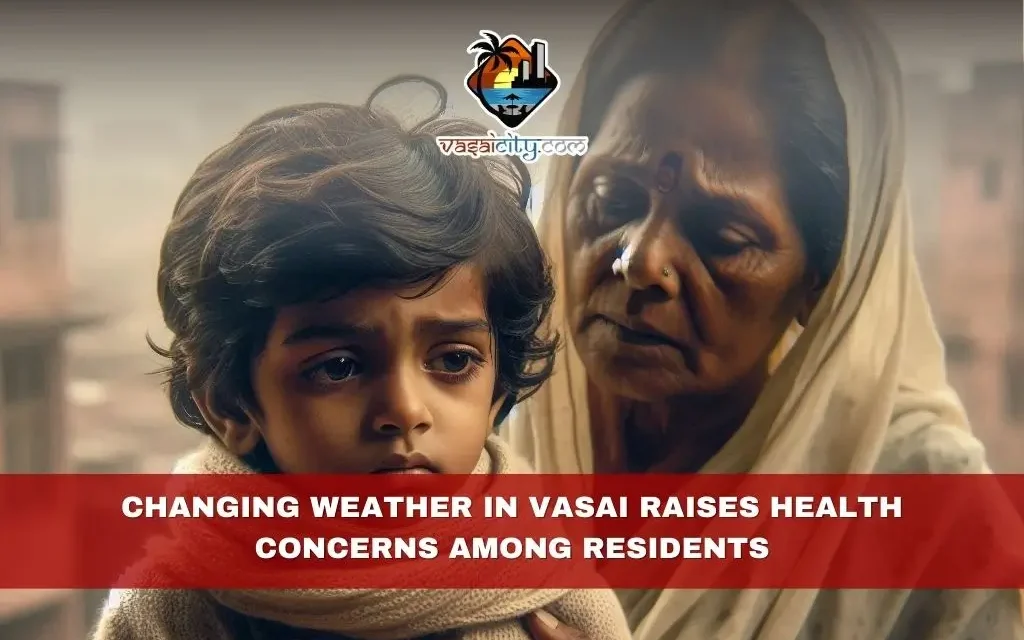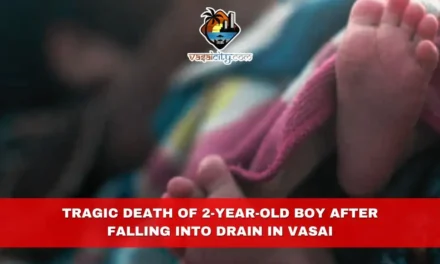In recent days, the residents of Vasai have been experiencing drastic shifts in the weather, with mornings starting off pleasantly cool, followed by a significant rise in temperatures by afternoon, and ending with intermittent rain showers. These fluctuations are typical during October in Maharashtra, where the monsoon season winds down but leaves behind unsettled weather patterns. However, this year’s swings in temperature have brought along a troubling side effect— a rise in health issues among Vasai residents, primarily fevers, colds, and respiratory problems.
As the weather toggles between chilly and humid, local health clinics, private hospitals, and government health centers have seen a noticeable increase in the number of patients reporting symptoms like fever, sore throat, cough, and respiratory distress. Vasai’s primary healthcare facilities are getting busier as people seek relief from these seasonal ailments, which can be especially difficult to manage without appropriate medical care. This wave of illnesses has brought into focus the toll that rapid environmental changes can take on community health, especially for those with pre-existing respiratory or immunity-related conditions.
Vasai’s changing climate is part of a larger pattern seen across Maharashtra, where the monsoon season hasn’t yet fully exited but has receded enough to let in heat and humidity. In districts like Palghar, including areas surrounding Vasai, post-monsoon showers have been sporadic. The few bursts of rain, combined with the overall warmth of the season, have left the air thick and damp. These conditions can aggravate respiratory problems, and symptoms like itchy eyes, sore throats, and even breathing difficulties are being reported with increasing frequency.
Adding to the discomfort, daytime temperatures in Vasai are markedly high, even though the nights bring a bit of respite with cooler air. However, as the rains take a pause, roads and pathways around Vasai have become prone to dust accumulation, exacerbating air quality issues. This is particularly problematic along busy roads where vehicular traffic stirs up dust, causing irritation for pedestrians and increasing the risk of respiratory illnesses. The deteriorating air quality has worsened respiratory conditions like asthma, as well as infections that thrive in the fluctuating weather.
To address this surge in illnesses, local health authorities are urging residents to take proactive measures to protect themselves and reduce their exposure to potential health risks. The humid weather, in combination with poor air quality, makes it especially important for individuals to adopt safety precautions. Some of the common health concerns that doctors and health practitioners are currently observing include symptoms such as throat irritation, itchy eyes, and a general feeling of discomfort, all of which can be amplified in polluted environments. Moreover, people with respiratory conditions like asthma are finding it particularly challenging to cope with the shifting weather.
The health department has issued several recommendations to the public to help mitigate these issues. Authorities advise residents to stay vigilant about their health and seek medical attention if they experience any discomfort or symptoms. For instance, if you notice that someone in your household is developing respiratory issues, doctors recommend that immediate medical intervention is crucial. Delaying treatment for such seasonal ailments may lead to more severe complications, especially among vulnerable groups such as children, elderly individuals, and those with chronic health issues.
Alongside these guidelines, general preventive measures are being encouraged. Local health officials suggest that people should use masks to shield themselves from dust and pollutants, which are heightened due to the change in air quality. Residents are advised to drink boiled and filtered water, a precaution that helps in preventing waterborne infections that can also arise in such transitional weather. For those who experience mild symptoms or discomfort, it is best to rest at home and avoid crowded places to prevent further spread of infections.
Personal hygiene practices, especially in public spaces, are being emphasized. Covering one’s mouth and nose when coughing or sneezing is a simple yet effective way to reduce the transmission of germs. Similarly, it’s recommended to limit exposure to dusty areas as much as possible. Schools and offices are also advised to be mindful of these seasonal health challenges by ensuring clean indoor air and encouraging preventive health practices among students and staff.
The dust and debris along Vasai’s roads have become a particular source of concern, as they can aggravate respiratory issues and make it harder for people with compromised immune systems to recover. Health experts point out that even individuals without any previous history of respiratory issues can experience symptoms due to the combined effects of changing weather and dusty conditions. The mix of high temperatures, dust, and humidity can strain the immune system, making it more susceptible to common colds, coughs, and other respiratory illnesses.
In addition to self-care, the local government and health organizations are exploring longer-term solutions to mitigate health impacts from seasonal changes. While there is no immediate solution to prevent weather fluctuations, raising awareness about health and safety practices is key to helping residents cope better. Vasai, known for its humid climate and seasonal monsoons, often faces similar health patterns, but this year’s swift weather swings have highlighted the need for additional health support systems.
Vasai residents are encouraged to make these preventive measures a habit during such transitional weather periods, as the region’s environment is prone to rapid changes. Maintaining good health practices like staying hydrated, resting adequately, and avoiding exposure to excessive dust can help prevent seasonal ailments. Health officials are hopeful that with greater awareness and adherence to these precautions, residents can navigate this season with minimal health disruptions.
In conclusion, Vasai’s residents are advised to be alert and take these health warnings seriously. Although the October heat, occasional rains, and fluctuating weather patterns may seem like a regular seasonal phenomenon, their impact on health can be significant. Staying informed about the latest health updates and implementing recommended preventive measures will go a long way in ensuring that the community stays safe and healthy amidst these changing weather conditions. By keeping these guidelines in mind, Vasai can work together to combat the seasonal illnesses and stay resilient through this unpredictable October climate.













